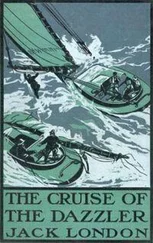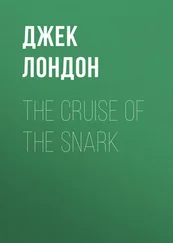Jack London - The Cruise of the Snark
Здесь есть возможность читать онлайн «Jack London - The Cruise of the Snark» весь текст электронной книги совершенно бесплатно (целиком полную версию без сокращений). В некоторых случаях можно слушать аудио, скачать через торрент в формате fb2 и присутствует краткое содержание. Жанр: Классическая проза, Морские приключения, на английском языке. Описание произведения, (предисловие) а так же отзывы посетителей доступны на портале библиотеки ЛибКат.
- Название:The Cruise of the Snark
- Автор:
- Жанр:
- Год:неизвестен
- ISBN:нет данных
- Рейтинг книги:3 / 5. Голосов: 1
-
Избранное:Добавить в избранное
- Отзывы:
-
Ваша оценка:
- 60
- 1
- 2
- 3
- 4
- 5
The Cruise of the Snark: краткое содержание, описание и аннотация
Предлагаем к чтению аннотацию, описание, краткое содержание или предисловие (зависит от того, что написал сам автор книги «The Cruise of the Snark»). Если вы не нашли необходимую информацию о книге — напишите в комментариях, мы постараемся отыскать её.
The Cruise of the Snark — читать онлайн бесплатно полную книгу (весь текст) целиком
Ниже представлен текст книги, разбитый по страницам. Система сохранения места последней прочитанной страницы, позволяет с удобством читать онлайн бесплатно книгу «The Cruise of the Snark», без необходимости каждый раз заново искать на чём Вы остановились. Поставьте закладку, и сможете в любой момент перейти на страницу, на которой закончили чтение.
Интервал:
Закладка:
"What's that abaft your ankle-bone?" said I.
"Nothing," said she.
"All right," said I; "but put some corrosive sublimate on it just the same. And some two or three weeks from now, when it is well and you have a scar that you will carry to your grave, just forget about the purity of your blood and your ancestral history and tell me what you think about yaws anyway."
It was as large as a silver dollar, that yaw, and it took all of three weeks to heal. There were times when Charmian could not walk because of the hurt of it; and there were times upon times when she explained that abaft the ankle-bone was the most painful place to have a yaw. I explained, in turn, that, never having experienced a yaw in that locality, I was driven to conclude the hollow of the instep was the most painful place for yaw-culture. We left it to Martin, who disagreed with both of us and proclaimed passionately that the only truly painful place was the shin. No wonder horse- racing is so popular.
But yaws lose their novelty after a time. At the present moment of writing I have five yaws on my hands and three more on my shin. Charmian has one on each side of her right instep. Tehei is frantic with his. Martin's latest shin-cultures have eclipsed his earlier ones. And Nakata has several score casually eating away at his tissue. But the history of the Snark in the Solomons has been the history of every ship since the early discoverers. From the "Sailing Directions" I quote the following:
"The crews of vessels remaining any considerable time in the Solomons find wounds and sores liable to change into malignant ulcers."
Nor on the question of fever were the "Sailing Directions" any more encouraging, for in them I read:
"New arrivals are almost certain sooner or later to suffer from fever. The natives are also subject to it. The number of deaths among the whites in the year 1897 amounted to 9 among a population of 50."
Some of these deaths, however, were accidental.
Nakata was the first to come down with fever. This occurred at Penduffryn. Wada and Henry followed him. Charmian surrendered next. I managed to escape for a couple of months; but when I was bowled over, Martin sympathetically joined me several days later. Out of the seven of us all told Tehei is the only one who has escaped; but his sufferings from nostalgia are worse than fever. Nakata, as usual, followed instructions faithfully, so that by the end of his third attack he could take a two hours' sweat, consume thirty or forty grains of quinine, and be weak but all right at the end of twenty-four hours.
Wada and Henry, however, were tougher patients with which to deal. In the first place, Wada got in a bad funk. He was of the firm conviction that his star had set and that the Solomons would receive his bones. He saw that life about him was cheap. At Penduffryn he saw the ravages of dysentery, and, unfortunately for him, he saw one victim carried out on a strip of galvanized sheet-iron and dumped without coffin or funeral into a hole in the ground. Everybody had fever, everybody had dysentery, everybody had everything. Death was common. Here to-day and gone to-morrow—and Wada forgot all about to-day and made up his mind that to-morrow had come.
He was careless of his ulcers, neglected to sublimate them, and by uncontrolled scratching spread them all over his body. Nor would he follow instructions with fever, and, as a result, would be down five days at a time, when a day would have been sufficient. Henry, who is a strapping giant of a man, was just as bad. He refused point blank to take quinine, on the ground that years before he had had fever and that the pills the doctor gave him were of different size and colour from the quinine tablets I offered him. So Henry joined Wada.
But I fooled the pair of them, and dosed them with their own medicine, which was faith-cure. They had faith in their funk that they were going to die. I slammed a lot of quinine down their throats and took their temperature. It was the first time I had used my medicine-chest thermometer, and I quickly discovered that it was worthless, that it had been produced for profit and not for service. If I had let on to my two patients that the thermometer did not work, there would have been two funerals in short order. Their temperature I swear was 105 degrees. I solemnly made one and then the other smoke the thermometer, allowed an expression of satisfaction to irradiate my countenance, and joyfully told them that their temperature was 94 degrees. Then I slammed more quinine down their throats, told them that any sickness or weakness they might experience would be due to the quinine, and left them to get well. And they did get well, Wada in spite of himself. If a man can die through a misapprehension, is there any immorality in making him live through a misapprehension?
Commend me the white race when it comes to grit and surviving. One of our two Japanese and both our Tahitians funked and had to be slapped on the back and cheered up and dragged along by main strength toward life. Charmian and Martin took their afflictions cheerfully, made the least of them, and moved with calm certitude along the way of life. When Wada and Henry were convinced that they were going to die, the funeral atmosphere was too much for Tehei, who prayed dolorously and cried for hours at a time. Martin, on the other hand, cursed and got well, and Charmian groaned and made plans for what she was going to do when she got well again.
Charmian had been raised a vegetarian and a sanitarian. Her Aunt Netta, who brought her up and who lived in a healthful climate, did not believe in drugs. Neither did Charmian. Besides, drugs disagreed with her. Their effects were worse than the ills they were supposed to alleviate. But she listened to the argument in favour of quinine, accepted it as the lesser evil, and in consequence had shorter, less painful, and less frequent attacks of fever. We encountered a Mr. Caulfeild, a missionary, whose two predecessors had died after less than six months' residence in the Solomons. Like them he had been a firm believer in homeopathy, until after his first fever, whereupon, unlike them, he made a grand slide back to allopathy and quinine, catching fever and carrying on his Gospel work.
But poor Wada! The straw that broke the cook's back was when Charmian and I took him along on a cruise to the cannibal island of Malaita, in a small yacht, on the deck of which the captain had been murdered half a year before. Kai-kai means to eat, and Wada was sure he was going to be kai-kai'd. We went about heavily armed, our vigilance was unremitting, and when we went for a bath in the mouth of a fresh-water stream, black boys, armed with rifles, did sentry duty about us. We encountered English war vessels burning and shelling villages in punishment for murders. Natives with prices on their heads sought shelter on board of us. Murder stalked abroad in the land. In out-of-they-way places we received warnings from friendly savages of impending attacks. Our vessel owed two heads to Malaita, which were liable to be collected any time. Then to cap it all, we were wrecked on a reef, and with rifles in one hand warned the canoes of wreckers off while with the other hand we toiled to save the ship. All of which was too much for Wada, who went daffy, and who finally quitted the Snark on the island of Ysabel, going ashore for good in a driving rain-storm, between two attacks of fever, while threatened with pneumonia. If he escapes being kai- kai'd, and if he can survive sores and fever which are riotous ashore, he can expect, if he is reasonably lucky, to get away from that place to the adjacent island in anywhere from six to eight weeks. He never did think much of my medicine, despite the fact that I successfully and at the first trail pulled two aching teeth for him.
The Snark has been a hospital for months, and I confess that we are getting used to it. At Meringe Lagoon, where we careened and cleaned the Snark's copper, there were times when only one man of us was able to go into the water, while the three white men on the plantation ashore were all down with fever. At the moment of writing this we are lost at sea somewhere northeast of Ysabel and trying vainly to find Lord Howe Island, which is an atoll that cannot be sighted unless one is on top of it. The chronometer has gone wrong. The sun does not shine anyway, nor can I get a star observation at night, and we have had nothing but squalls and rain for days and days. The cook is gone. Nakata, who has been trying to be both cook and cabin boy, is down on his back with fever. Martin is just up from fever, and going down again. Charmian, whose fever has become periodical, is looking up in her date book to find when the next attack will be. Henry has begun to eat quinine in an expectant mood. And, since my attacks hit me with the suddenness of bludgeon-blows I do not know from moment to moment when I shall be brought down. By a mistake we gave our last flour away to some white men who did not have any flour. We don't know when we'll make land. Our Solomon sores are worse than ever, and more numerous. The corrosive sublimate was accidentally left ashore at Penduffryn; the peroxide of hydrogen is exhausted; and I am experimenting with boracic acid, lysol, and antiphlogystine. At any rate, if I fail in becoming a reputable M.D., it won't be from lack of practice.
Читать дальшеИнтервал:
Закладка:
Похожие книги на «The Cruise of the Snark»
Представляем Вашему вниманию похожие книги на «The Cruise of the Snark» списком для выбора. Мы отобрали схожую по названию и смыслу литературу в надежде предоставить читателям больше вариантов отыскать новые, интересные, ещё непрочитанные произведения.
Обсуждение, отзывы о книге «The Cruise of the Snark» и просто собственные мнения читателей. Оставьте ваши комментарии, напишите, что Вы думаете о произведении, его смысле или главных героях. Укажите что конкретно понравилось, а что нет, и почему Вы так считаете.







